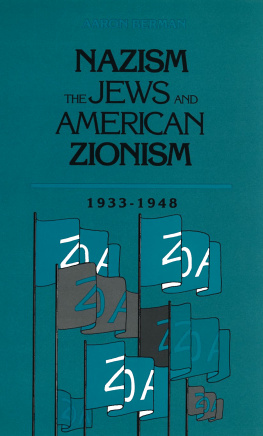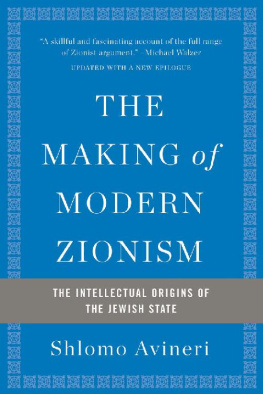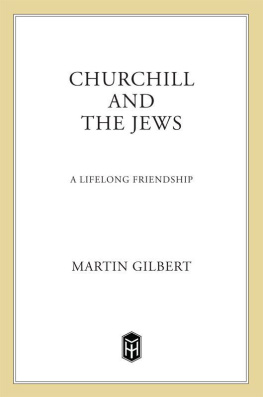ZIONISM
BY
Max Nordau
ZIONISM
Among the persons of the educated classes who follow with any attention all the more important movements of the times, it would now be difficult to find one to whom the word "Zionism" is quite unknown. People are generally aware that it describes an idea and a movement that in the last years has found numerous adherents among the Jews of all countries, but especially among those of the East. Comparatively few, however, both among the Gentiles and the Jews themselves, have a perfectly clear notion of the aims and ways of Zionism; the Gentiles, because they do not care sufficiently for Jewish affairs to take the trouble to inform themselves at first hand as to the particulars; the Jews, because they are intentionally led astray by the enemies of Zionism, by lies and calumnies, or because even among the fervent Zionists there are not many who have probed the whole Zionist idea to the bottom, and are willing or able to present it in a clear and comprehensible fashion, without exaggeration and polemical heat.
I will endeavor to furnish readers of good faith, who are not biased, and have no other interest than that of gaining authentic information about a phenomenon in contemporary history, as concisely and soberly as possible with all the facts, as they really are, not as they are reflected in muddled brains, or distorted and falsified by calumniators.
I.
Zionism is a new word for a very old object, in so far as it merely expresses the yearning of the Jewish people for Zion. Since the destruction of the second temple by Titus, since the dispersion of the Jewish nation in all countries, this people has not ceased to long intensely, and hope fervently, for the return to the lost land of their fathers. This yearning for, and hope in, Zion on the part of the Jews was the concrete, I might say, the geographical, aspect of their Messianic faith, which in its turn forms an essential part of their religion.
Messianism and Zionism were really, for nearly two thousand years, identical conceptions, and without caviling and hair-splitting interpretation, it would not be easy to make a distinction between the prayers for the appearance of the promised Messiah, and those for the not less promised return to the historical home,both of which stand side by side on every page of the Jewish liturgy. These prayers were, until a few generations ago, meant literally by every Jew, as they still are by the simple believing Jews. The Jews had no other idea than that they were a people which as a punishment for its sins had lost the land of its forefathers, which was condemned to live as strangers in strange lands, and whose great sufferings would first cease when it was again assembled on the consecrated soil of the Holy Land.
This gradually changed about the middle of the eighteenth century, when enlightenment first began to find its way into Jewdom, in the person of its first herald, Moses Mendelssohn, the popular philosopher. The faith of the Jews became more lukewarm; the educated classes, where they did not simply convert themselves to Christianism, began to regard the doctrines of their religion in a rationalist manner; for them the dispersion of the Jewish people was a final and unalterable fact; they emptied the conception of the Messiah and of Zion of every concrete meaning, and arranged for themselves a singular doctrine, according to which the Zion promised to the Jews was to be understood only in a spiritual sense, as the setting up of the Jewish monotheism in the whole world, as the future triumph of Jewish ethics over the less sublime and less noble moral teaching of the other nations. An American rabbi reduced this conception to the striking formula, "Our Zion is in Washington." The Mendelssohn teaching logically developed in the first half of the nineteenth century into the "Reform," which deliberately broke with Zionism. For the Reform Jew, the word Zion had just as little meaning as the word dispersion. He does not feel himself in any diaspora. He denies that there is a Jewish people and that he is a member of it. He desires only to belong to the people in whose midst he lives. For him Judaism is a purely religious conception which has nothing whatever to do with nationality. The land of his birth is his fatherland, and he will know of no other. The idea of a return to Palestine excites him either to indignation or to laughter. He answers it with the well-known, silly, would-be witticism, "If the Jewish state is again set up in Palestine, I will ask to be its ambassador in Paris."
The thinking Jew did not fail, however, to perceive, in the course of time, that Reform Judaism is a half measure, a compromise, which like every compromise, contains the germ of destruction, as it cannot for one instant resist logical criticism. Whom shall the Reform Judaism satisfy? The believing Jew? He rejects it with the greatest abhorrence. The unbelieving Jew? He despises it as hypocrisy and phrase-mongering. The Jew who really desires to break with his national past and to be absorbed by his Christian surroundings? For that Jew, Reform Judaism does not suffice; he goes a step farther, the step that leads to the baptismal font. Still less does it satisfy the Jew who desires to guard Jewdom against destruction and to preserve it as an ethnical individuality. For to him an openly expressed abandonment of all national aspirations is synonymous with a self-condemnation of the Jewish people to a perhaps slow, but sure, death. Reform Judaism without Zionism, that is to say, without the wish and the hope for a reassembling of the Jewish people, has no future. At the best, it can only be regarded as a somewhat crooked path that leads to Christianity. He who desires to reach that goal can find straighter and shorter routes.
II.
And so it has come about that the generations which had been under the influence of the Mendelssohnian rhetoric and enlightenment, of reform and assimilation, have, in the last twenty years of the nineteenth century, been followed by a new generation which seeks to take up a standpoint other than the traditional towards the question of Zion. These new Jews shrug their shoulders at that twaddle which has been the fashion among rabbis and literati for the last hundred years, and which boasts of a "Mission of Jewdom," said to consist in this, that the Jews must live forever in dispersion among the peoples in order to act as their teachers and models of morality, and to educate them gradually to pure rationalism, to a general brotherhood of mankind, and to an ideal cosmopolitanism. They declare the mission swagger to be either presumption or foolishness. They, more modest and more practical, demand only the right for the Jewish people to live and to develop itself, according to its abilities, up to the natural limits of its type. They have become convinced that this is not possible in dispersion, as, under that condition, prejudice, hatred, and contempt continually follow and oppress them, and either stint their development, or force them to an ethnical mimicry which necessarily makes of them, instead of original types with a right to existence, mediocre or bad copies of foreign models. They therefore work methodically with a view to rendering the Jewish people once more a normal one, which lives on its own soil, and accomplishes all economical, intellectual, moral, and political functions of a civilized nation.










